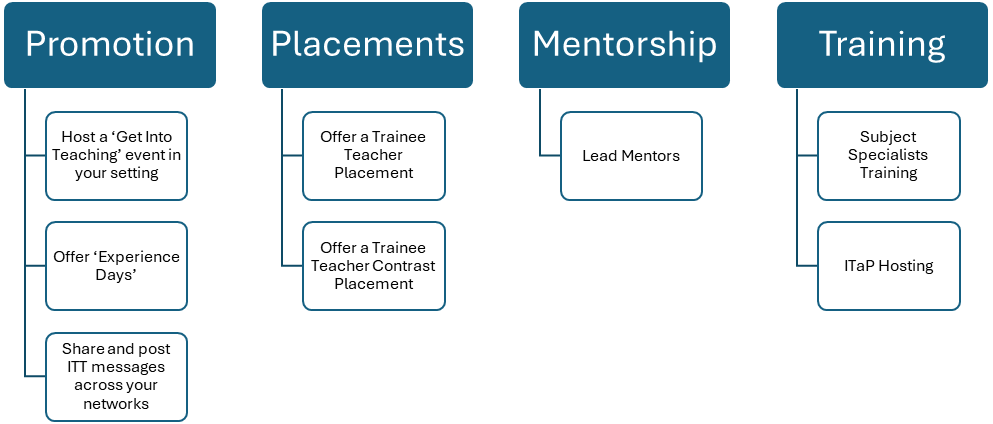Initial Teacher Training update – Spring 2024

In the continually changing landscape of education, there is a constant which underpins all of our work – the need to identify, develop and nurture talented teachers through a robust initial teacher training (ITT) programme. Our latest update champions the importance of a collaborative, school-led approach to ITT, and sets out some clear pathways to engagement for schools and settings across the Saffron Teaching School Hub area.
ITT – The Evidence Base
 There is a wealth of research which highlights the importance and impact of high-quality teacher training; the benefits of which extend far beyond the individual teacher:
There is a wealth of research which highlights the importance and impact of high-quality teacher training; the benefits of which extend far beyond the individual teacher:
- Improved Student Outcomes: High-quality initial teacher training enhances educators' pedagogical strategies, leading to better academic results for students (EEF, 2019; DfE, 2020).
- Retention and Job Satisfaction: Comprehensive initial training increases teacher retention and job satisfaction, fostering a positive school culture (DfE, 2018; EEF, 2021).
- Promotion of Inclusive Practices: Rigorous training programs equip teachers with skills to create inclusive learning environments, benefiting all students (EEF, 2020).
- Professional Development: Initial training lays the foundation for lifelong learning and continuous professional development, keeping teachers updated on best practices (DfE, 2019).
- Effective Classroom Management: Training programs incorporating practical experience and mentorship improve teachers' ability to manage behaviour and enhance classroom dynamics (EEF, 2017).
Why is school-based ITT so critical?
- Contextualised Learning: In-school training offers new teachers the opportunity to immerse themselves in the specific context and culture of their school community. This first-hand experience allows them to gain insights into the school's ethos, policies, and procedures, ensuring a smooth transition into their roles (DfE, 2018).
- Mentorship and Support: ITT programs pair novice trainees with experienced mentors who provide guidance, feedback, and support tailored to their individual needs. Research indicates that such mentorship relationships significantly contribute to new teachers' professional growth, confidence, and job satisfaction (EEF, 2020).
- Integration of Theory and Practice: In-school training bridges the gap between theoretical knowledge gained through initial teacher training and practical application in the classroom. By engaging in real-world teaching experiences under the guidance of mentors, new teachers can refine their pedagogical skills and develop a deeper understanding of effective teaching strategies (DfE, 2019).
- Continuity and Collaboration: In-school training fosters a culture of collaboration and shared expertise within the school community. New teachers have the opportunity to collaborate with colleagues, share best practices, and participate in professional learning communities, promoting a culture of continuous improvement and innovation (EEF, 2021).
- Personalised Professional Development: In-school training allows for personalised professional development tailored to the unique needs and aspirations of new teachers. By engaging in ongoing observation, reflection, and dialogue with mentors and colleagues, new teachers can identify areas for growth and access targeted support to enhance their practice (DfE, 2020).
Pathways to Engagement
Engaging in initial teacher training (ITT) is pivotal for school leaders to shape the future of education. Through various pathways, we can actively support and empower aspiring teachers, fostering a culture of excellence within our schools.

Promotion:
- Host a ‘Get Into Teaching’ event: Inspire prospective educators to explore teaching careers by showcasing our school's ethos and practices.
- Offer ‘Experience Days’: Provide first-hand experience of our school's environment and teaching practices to aspiring teachers.
- Share ITT messages: Amplify information about training programs and opportunities to attract talented individuals to the teaching profession.
Placements:
- Offer Trainee Teacher Placements: Provide practical experience and mentorship to trainee teachers, preparing them for successful careers.
- Offer Trainee Teacher Contrast Placements: Expose trainee teachers to diverse learning environments, broadening their perspectives and skills.
Mentorship:
- Offer Lead Mentor capacity: Support trainee teachers' growth and development across a range of settings through personalised guidance and constructive feedback.
Training:
- Deliver face-to-face training by Subject Specialists: Enhance trainees' pedagogical and subject expertise through targeted sessions.
- Host Intensive Training and Practice Sessions (ITaP): Provide immersive learning experiences and practical opportunities for skill application in a supportive environment.
Your Next Steps in ITT
Find out more about our Pathways to Engagement, and how ITT can work for your school through the Saffron Teaching School Hub. Whether you're interested in offering placements, mentorship, training, or promoting teaching as a rewarding career, we have a pathway for you to contribute.
Contact us today to explore how your school can play a pivotal role in nurturing aspiring teachers and fostering excellence in education.
Contact: kerriemcgivern@saffron.academy
Tel: 01799 513030 ext. 1270
Saffron Teaching School Hub - Train to Teach - Support for Schools
